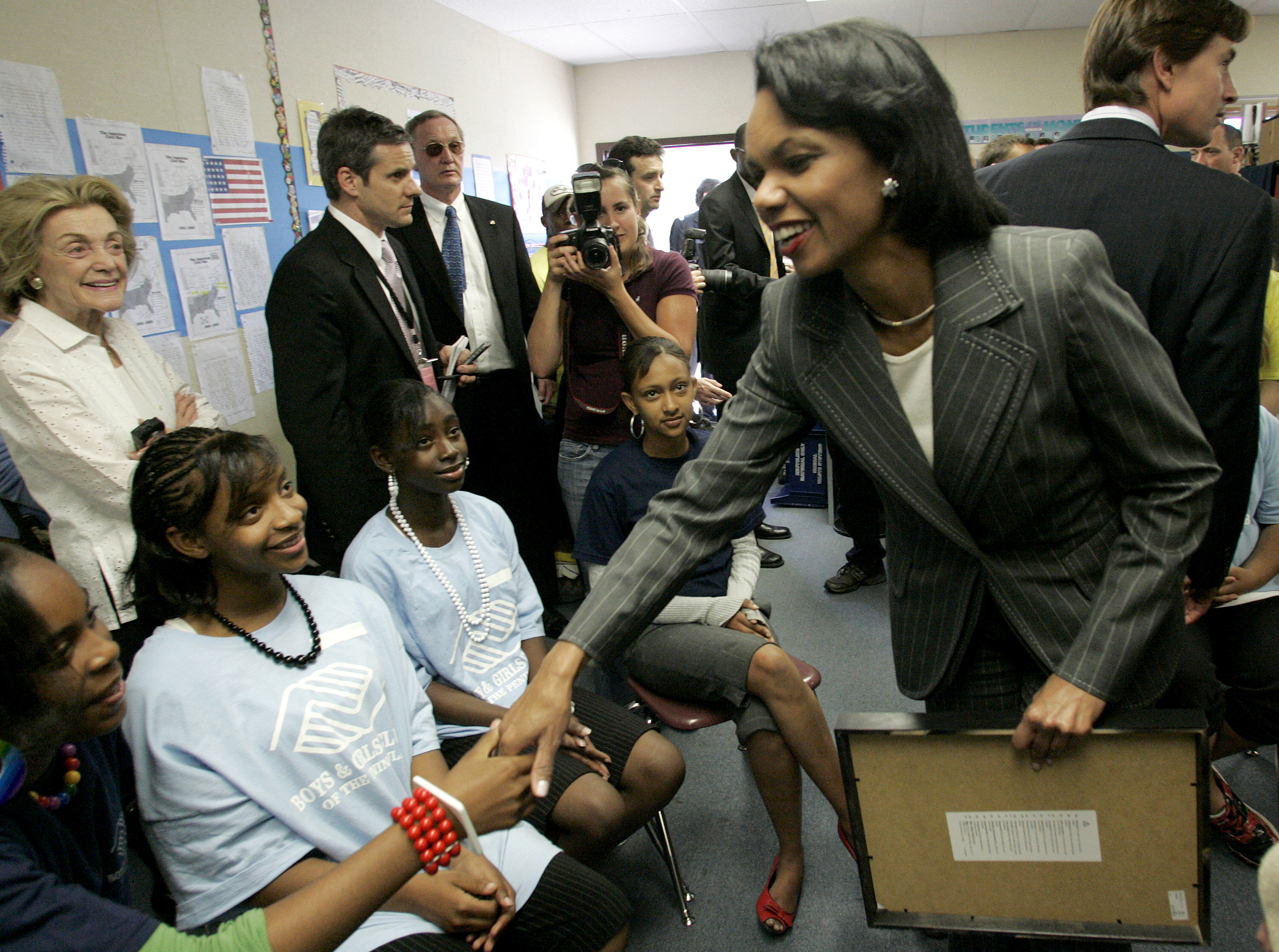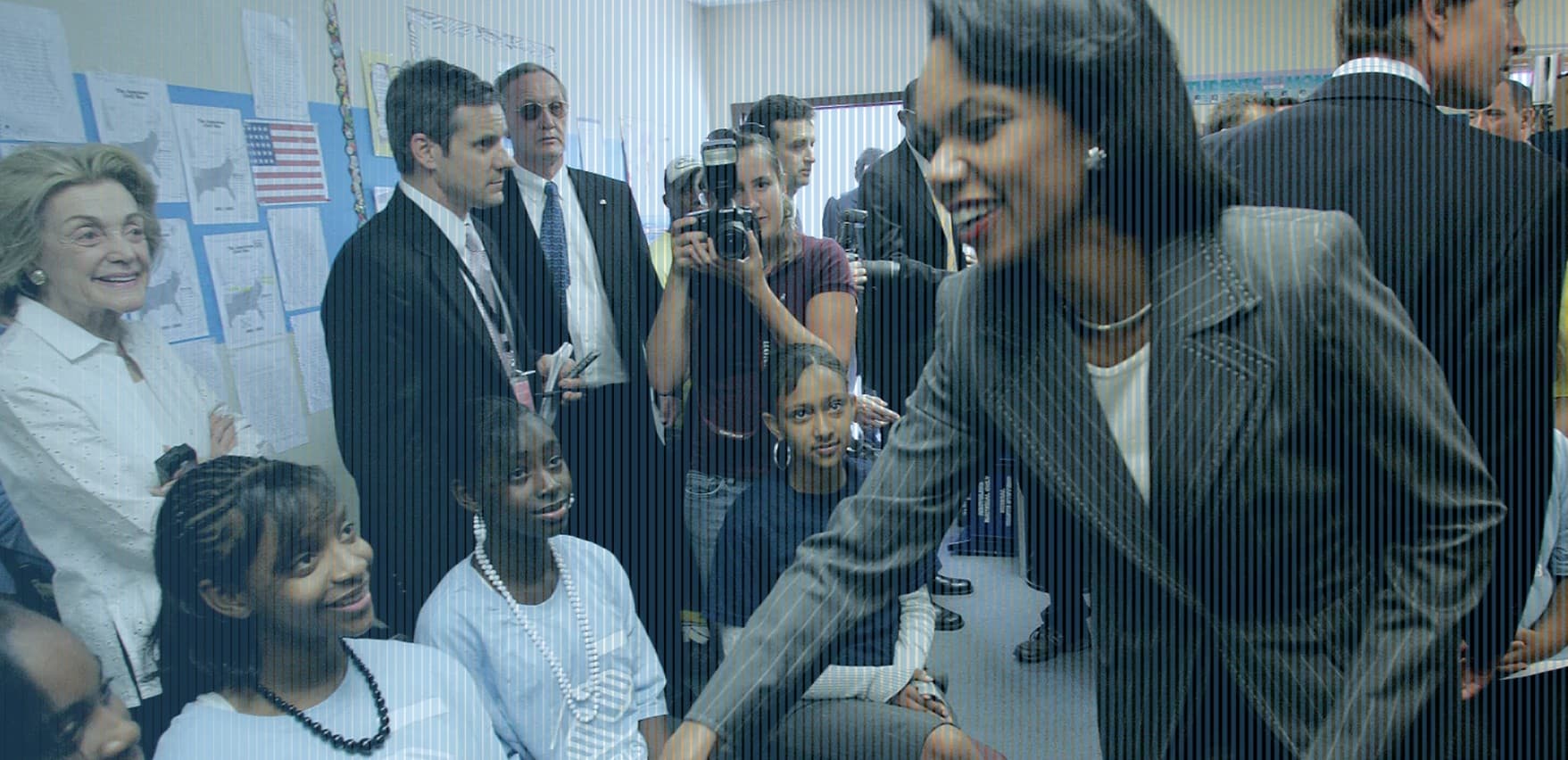The future of our country—whether it is our security, our prosperity, or indeed our social cohesion—all rests on the access of every child to a high-quality education. It is the great equalizer—the holy grail that has the power to change lives and lift the human spirit in ways that nothing else can.
Education is undoubtedly important for any country, but it is particularly important for the United States of America because we are not united by ethnicity, nationality, or religion. We are united by a creed—a belief that it doesn’t matter where you came from, it matters where you are going. A core element of the American Dream is that you can come from humble circumstances and do great things, and this dream has attracted people from every corner of the earth. But in order for a nation built on such an idea to hold together and thrive, that aspirational narrative had better remain true for its people. All of its people.
I grew up the daughter of a teacher and a high school guidance counselor in segregated Birmingham, Alabama. My parents were absolutely and relentlessly devoted to the power of education. To the Rices and Rays, it was FAITH, FAMILY, and EDUCATION. That article of faith began with my paternal grandfather, the son of a sharecropper, who did whatever it would take to get an education—the one thing no one could take from him. He paid for his first year of college by selling his cotton crop, and when his cotton ran out, he learned he could get a scholarship if he agreed to study to become a Presbyterian minister. So, he did . . . and my family has been Presbyterian and college-educated ever since. John Wesley Rice Sr. understood that it was going to change our family’s legacy forever. And it did.

If we still truly believe that every individual has the potential to grow, to learn, and to contribute, then we must recognize, with brutal honesty, the urgency of the state of public education in America. The truth is that many families are left without choices and are trapped by their location, trapped by a neighborhood school that is failing them and their children’s futures. When I can tell by a child’s zip code alone whether or not they have access to a quality education, we are failing. We know that children who cannot read by third grade likely will never read. They will be left behind. And if you think that the education of other people’s children is not your problem—think again. It will impact your life, and the life of our country. ALL of America has to be brought into the discussion of how we fix this national disgrace.
Believing in the transformative power of education, the Hoover Institution has made it a top priority, undertaking a number of initiatives, research programs, publications, and outreach efforts. In October 2024, the Education Futures Council released a report titled “Ours to Solve, Once—and for All,” calling for a “public emergency” level of reform in America’s K–12 public education system. It proposes a new “operating system” to move from a top-down to a bottom-up structure that focuses on student outcomes, empowers schools and educators, minimizes mandates, and uses incentives to reward professional mastery. Through rigorous data-driven research, Hoover scholars have also focused on expanding school choice to make it possible for parents, especially low-income parents, to have real choices. Charter schools, magnet programs, school vouchers, or funding models that follow the child, not just the building. No one wants to undermine public schools, but parents must be able to provide opportunities for their children when public schools fail them. The goal is to create a more effective and responsive system for all students.
Despite the fact that the United States invests more in education than almost any other developed nation, our students rank in the middle of the pack in reading and toward the bottom in math and science. Hoover Senior Fellow Eric Hanushek, one of the world’s leading scholars in the economics of education, has argued that the COVID-19 pandemic’s impact on learning loss has been overemphasized, and that student achievement had been declining well before the pandemic. We have increased funding for K–12 education for decades, and yet results continue to lag. It is clear that we do not have a funding problem, we have an effectiveness problem. Our system is broken and not only are we at risk for losing the American Dream, we are at risk of falling behind globally.
This is a crucial time to get this right. Technology has always been a catalyst of economic development, but it has punished those who cannot keep up. America must go fast and hard in harnessing the power of these new technologies so that they are accelerants of our prosperity. And the education of our people is at the core of what we must do.
The speed of the AI revolution and other emerging technologies challenges us to make sure that our children, at an early age, can access its promise. Our teachers must be trained and retrained to use the tools, capably and sensitively. Imagine every student, regardless of where they come from, with an educational pathway that is specifically tailored to their personal learning strengths—and challenges. That would be life-altering. We cannot be afraid of it; we must embrace it.
In the university, we cannot turn the clock back. AI tools will be used by our students. The challenge is to help them use these tools wisely—not as a substitute for learning and critical thinking, but as an assist.
Every single aspect of our society and our future depends on getting this right. We are now seeing the devastating effects of failing to deliver for so many decades. We must push ourselves yet again to try to think anew and to be inspired to remove barriers so that every child has a chance. Where is our million-person march for education reform? The status quo has fallen short, and the education community has got to stop being so insular, as the burden can and must be shouldered by us all.
Private businesses have a huge stake in the talent pipeline coming from our schools. We need their engagement. Governments at every level (national, state, and local) need adequately prepared students for a high-tech economy. We need their engagement. It is a matter of national strength and security, as a great nation cannot remain great if its children are unprepared to lead it. And it is a matter of the cohesion and viability of our social fabric.
My parents were right—education is the holy grail in a democracy. There are risks in the coming world, and there are opportunities. We must not fail this time.
Condoleezza Rice is the Tad and Dianne Taube Director of the Hoover Institution. A renowned scholar, educator, and practitioner of international relations, Dr. Rice was America’s 66th secretary of state from 2005 to 2009 and national security adviser from 2001 to 2005. She is the author of several bestselling books, including her memoir of service to the nation, No Higher Honor.

